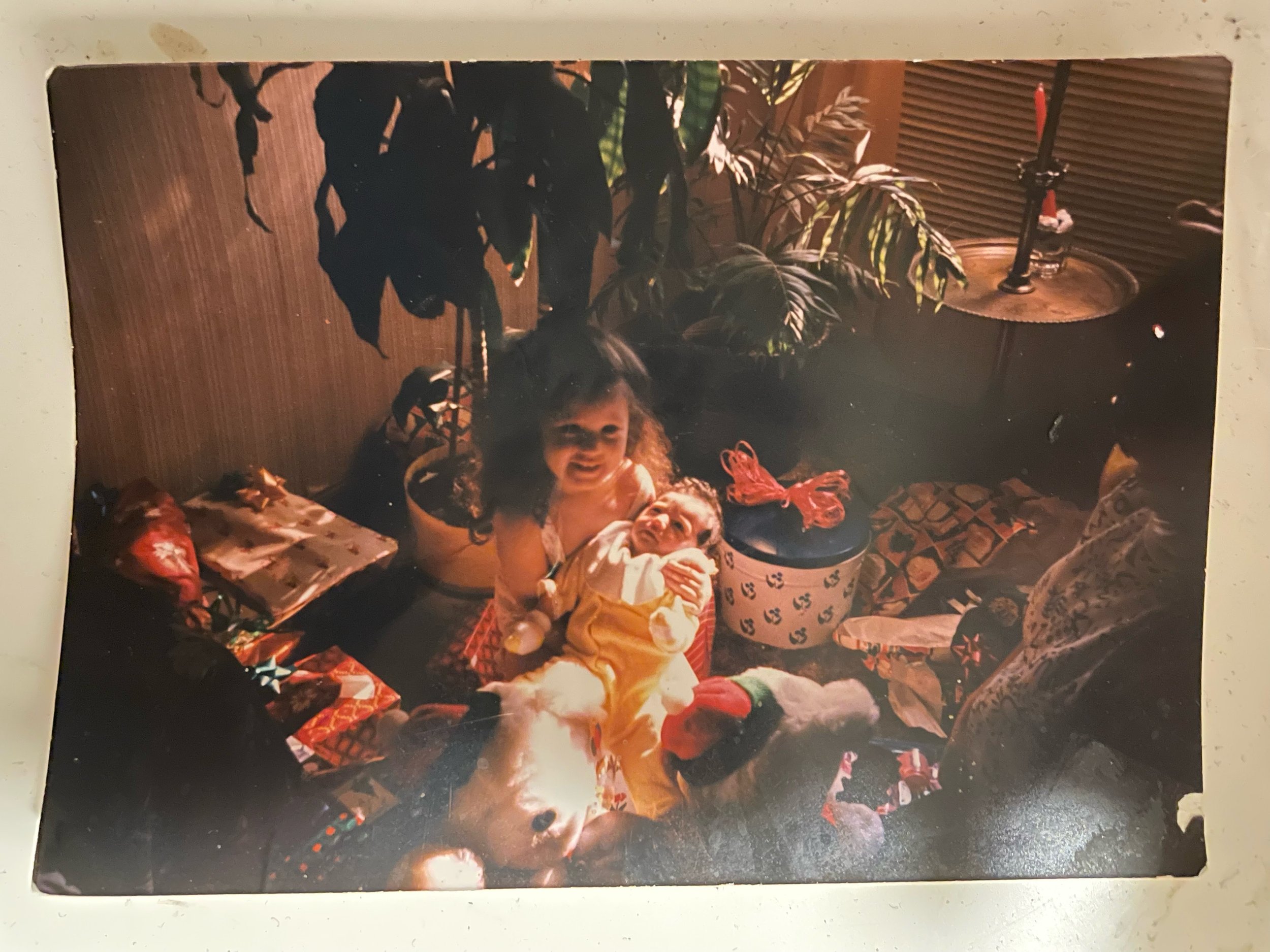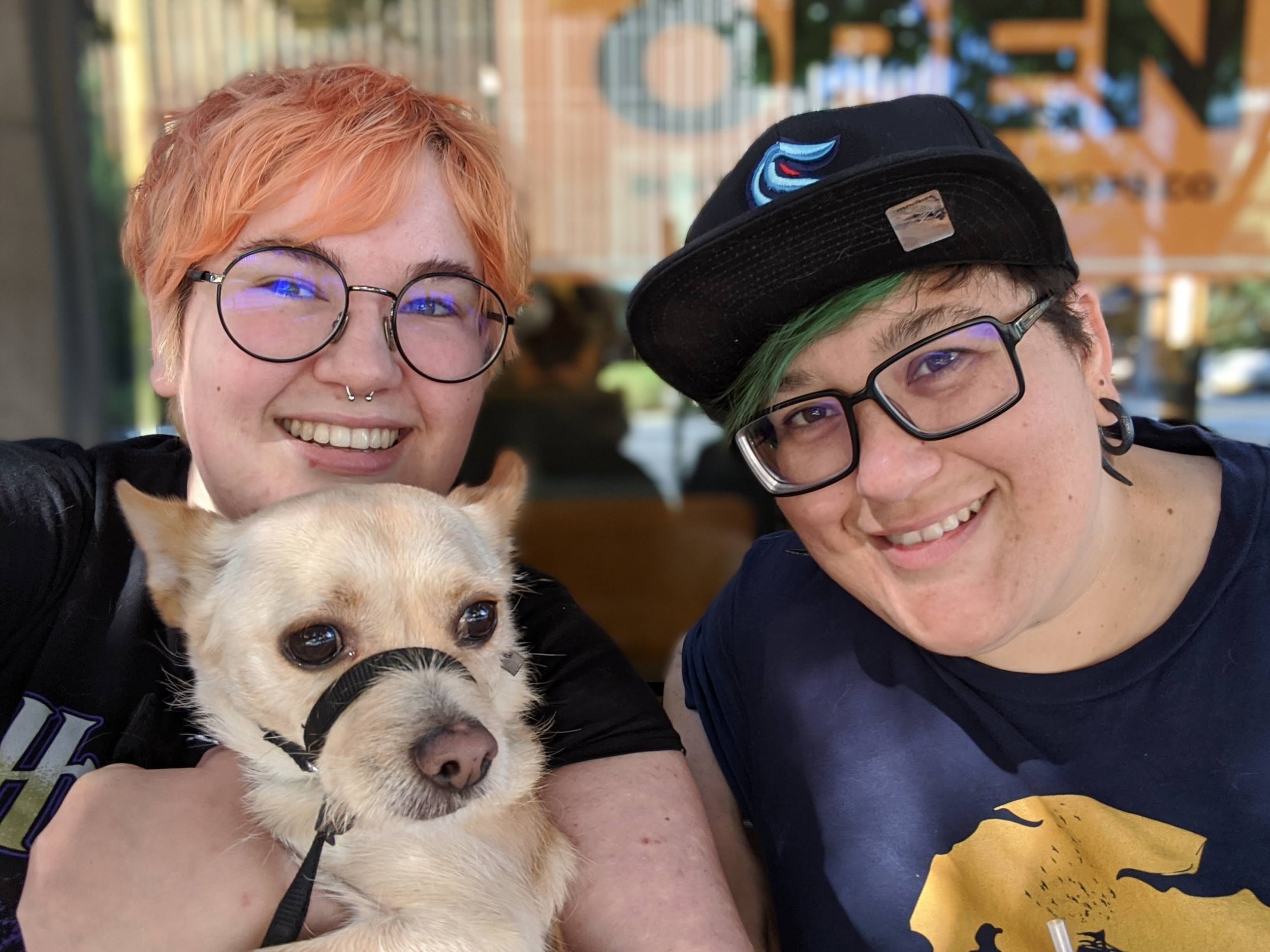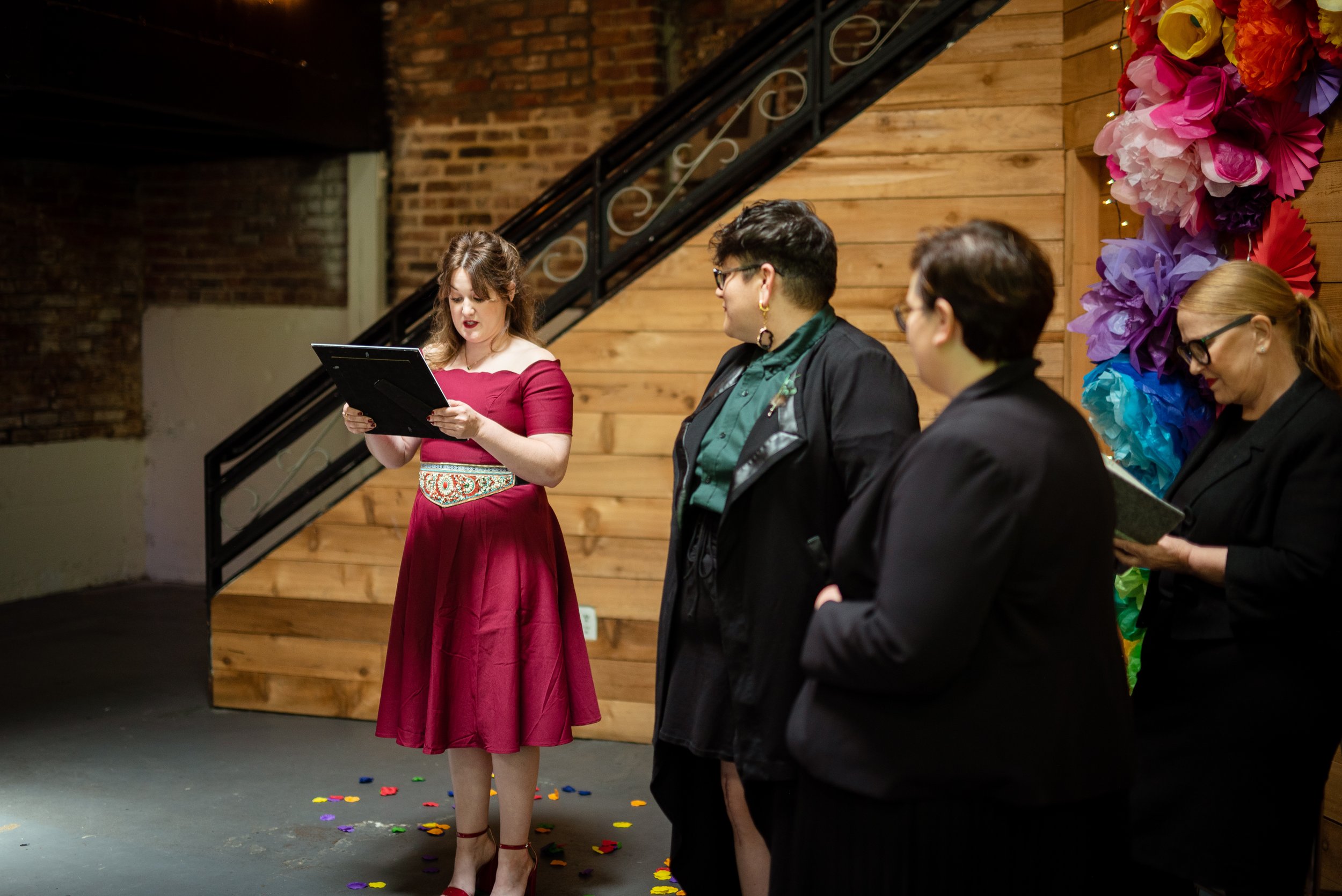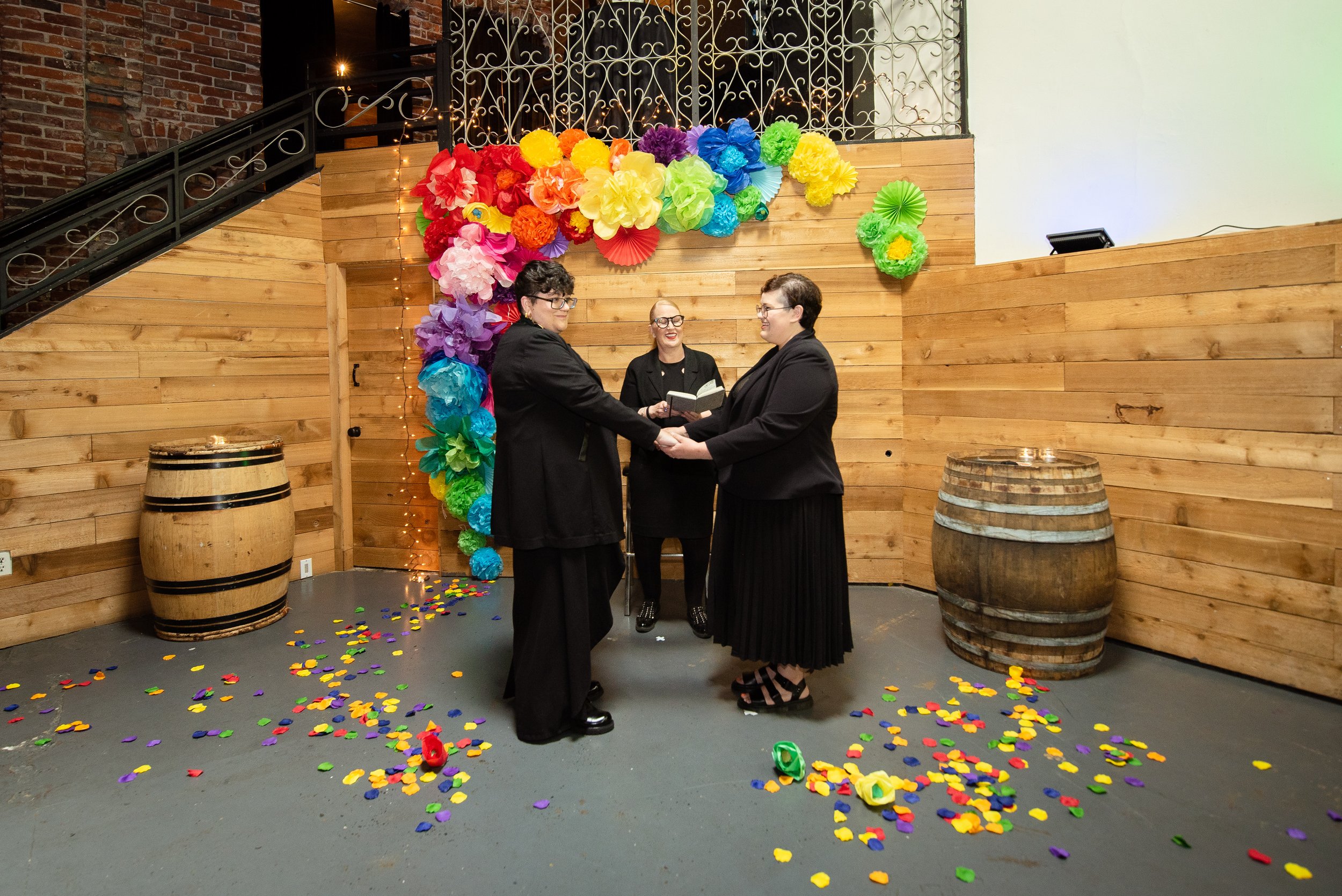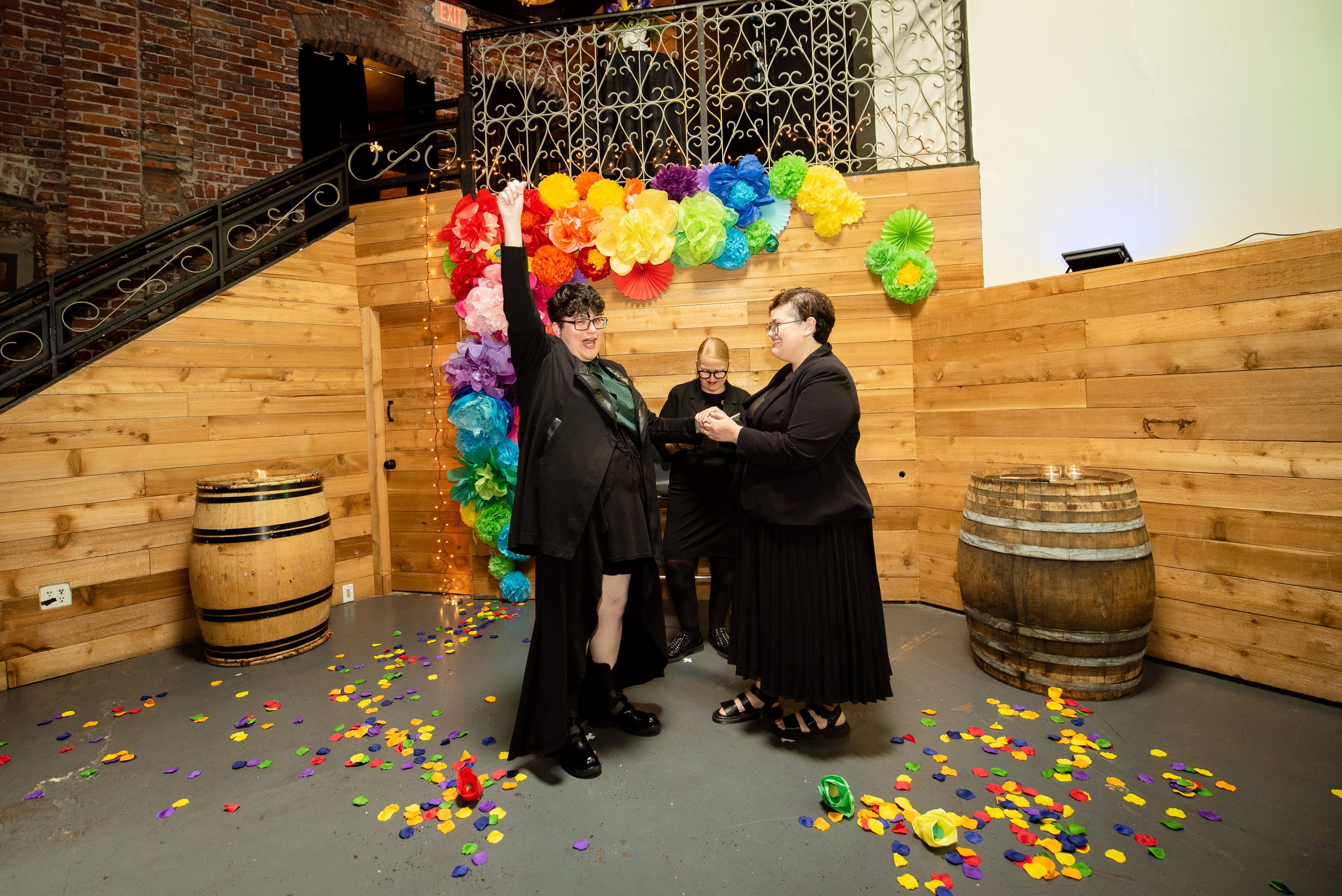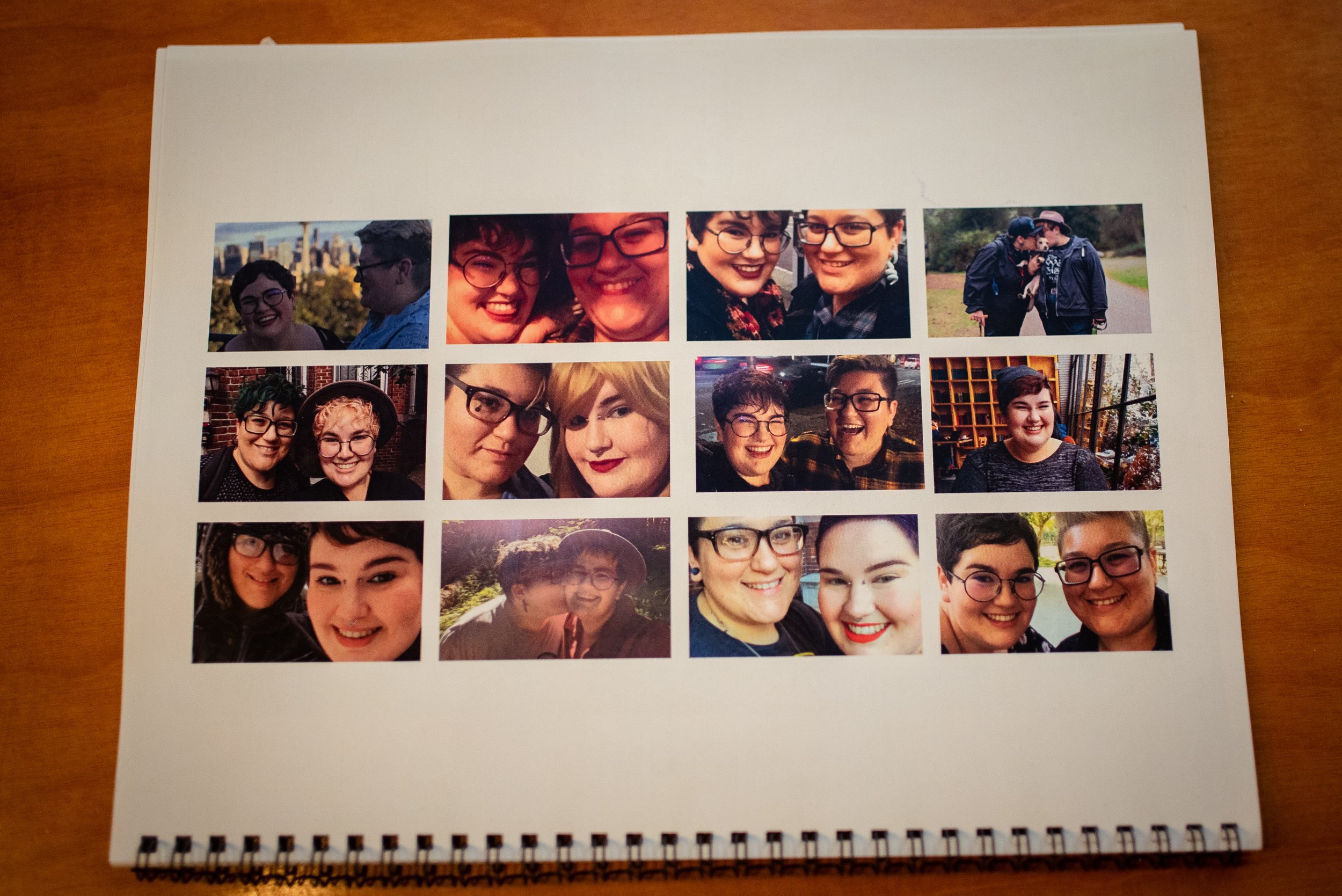No longer bound by others' judgement or negativity, Mariah and Corbin establish the witchy, full-hearted lives they've always wanted.
Mariah + Corbin // Seattle, Washington
If in a few decades time our species still exists, and Seattle's streets are neither underwater nor on fire, you might run across two women whom neighbors describe as witchy yet affable, crotchety yet full-hearted, and know that Mariah and Corbin have succeeded in building the life they want to live.
"We definitely want to be that weird couple that has a lot of strange stuff at home, like taxidermy or costumes," Corbin told me with the enthusiasm someone might have in describing what they would do if they won the lottery, "and we're already starting now." In their small one-bedroom apartment near downtown Seattle, you'll find decorations and keepsakes that are uniquely theirs: paintings of Mordor hung on the wall; a flower pot made from the head of a cabbage patch doll; a quote from Michael Scott ("We are all homos. Homo sapiens"); and mannequin heads donning wigs atop a shelf filled with books from any genre: poetry, fantasy, biography, comedy. All of which, together, sketch the life of two women no longer bothered by others' judgements or opinions.
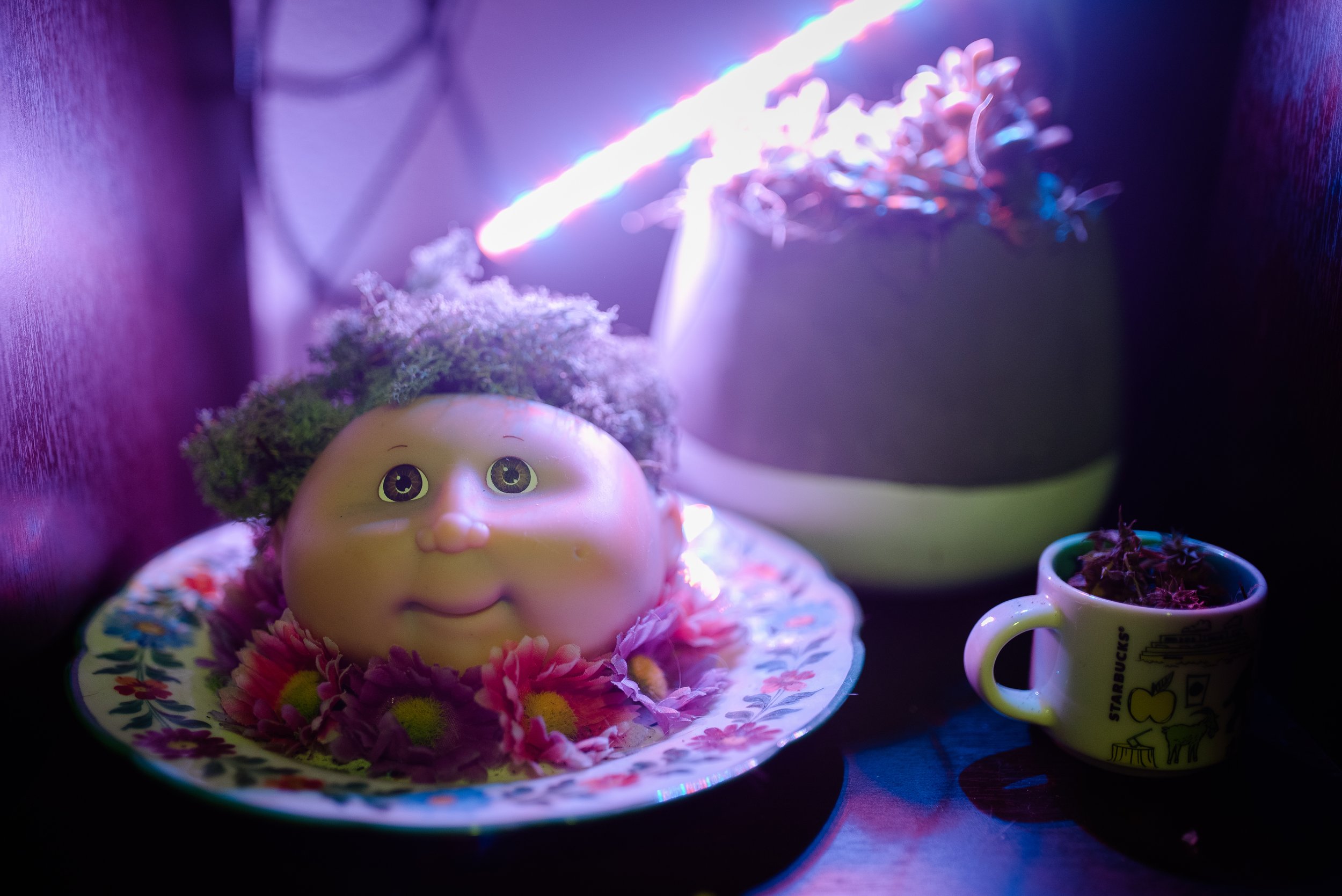
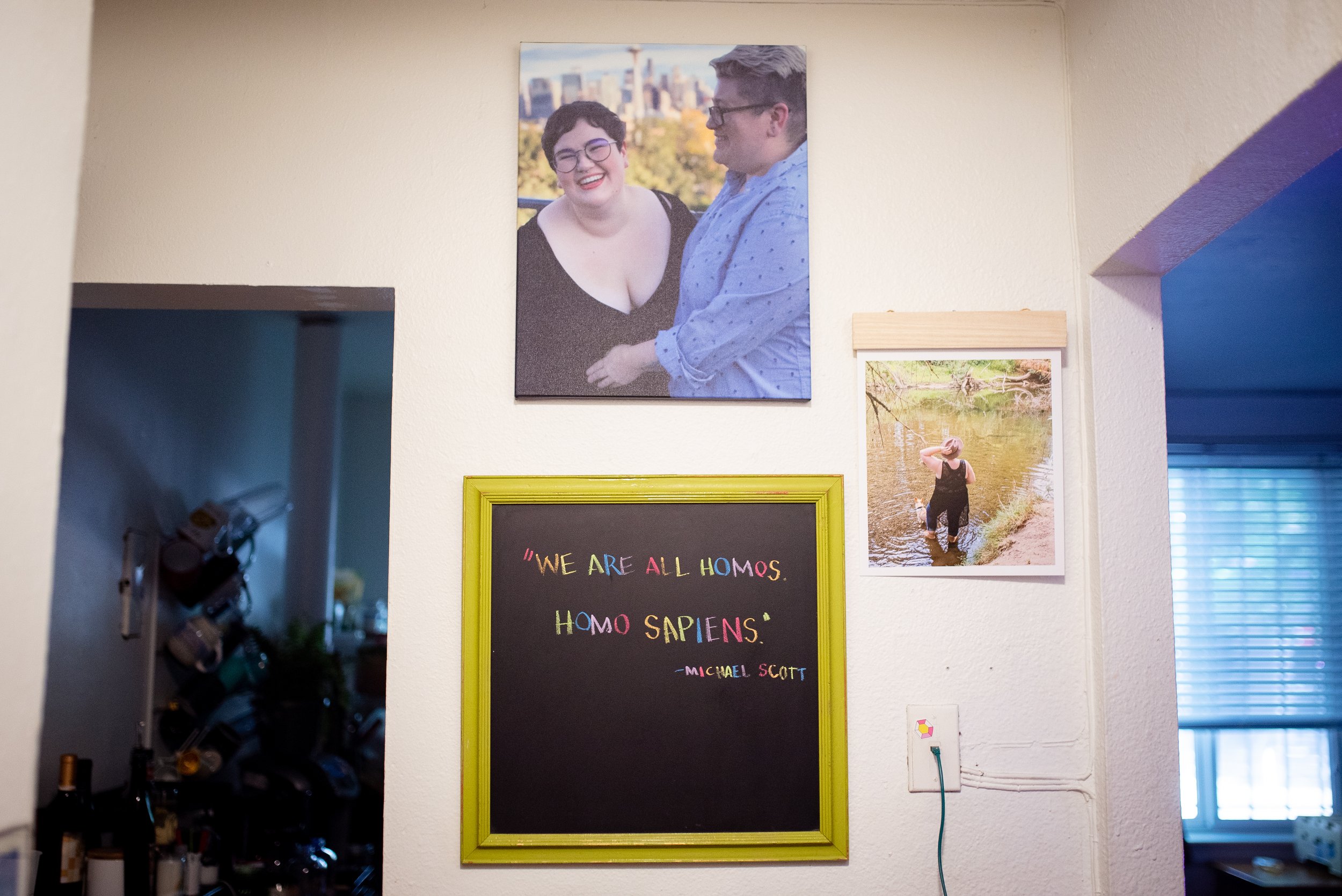
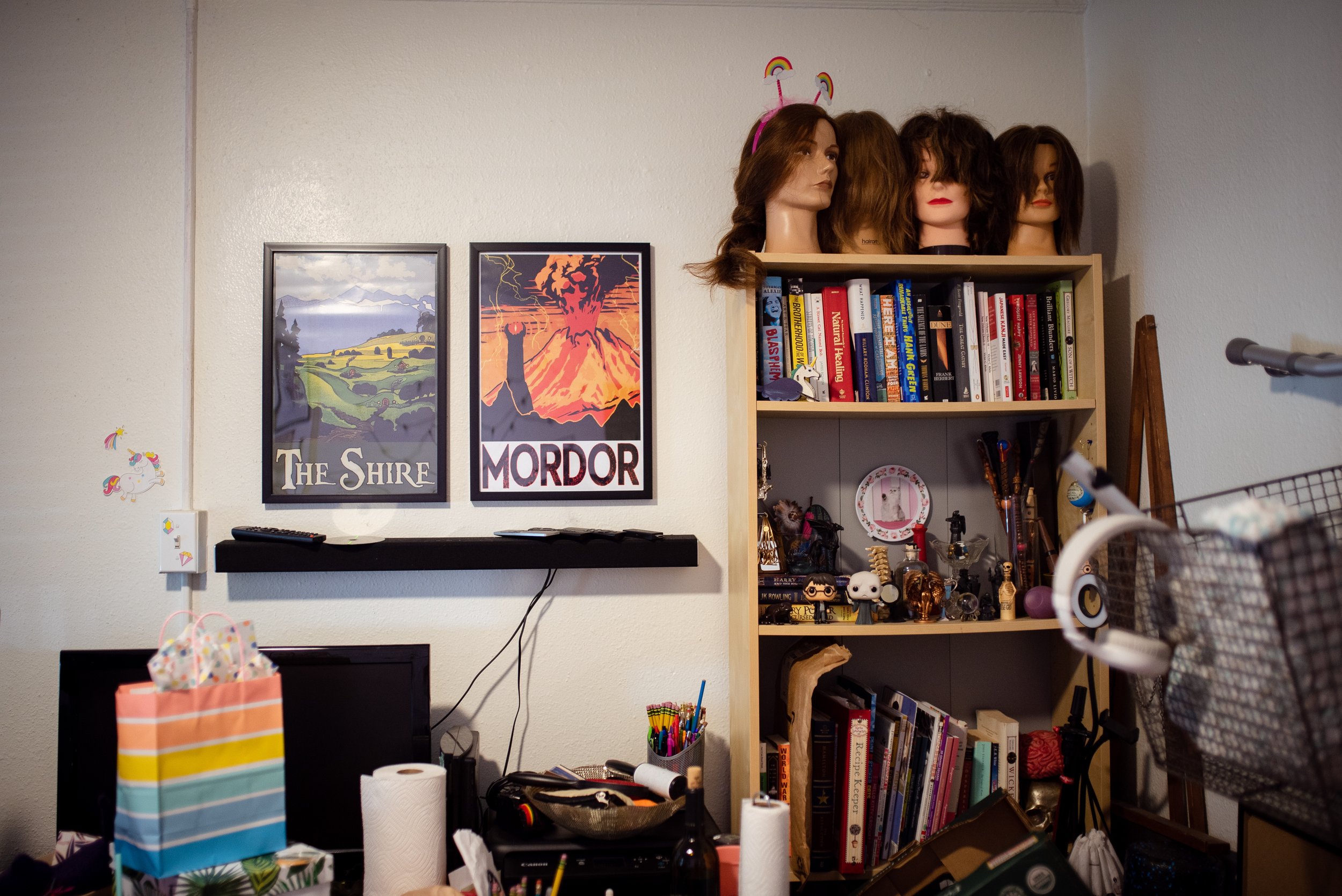
Items from around Mariah and Corbin’s home
"According to my grandmother, the very first sentence I ever said was, 'No, say me, no,'” Corbin told me, “and I’m like, ‘Yeah, that makes sense.’ Because I was always independent, and I always had a plan of what I wanted." Mariah added, "We're both open books, and kind of in your face about who we are and what we believe." It's a suitable trait for living in their area of Seattle, a dense neighborhood called Belltown that hugs the western coast of the city and where cars, bikes, unhoused people, old retired couples, and plumes of weed smoke all share a space.
Part of their desires to live on their own terms is to make up for years living on others'. Corbin lived in California with or near her family all through her 20's, caged by a religion she never felt could accept or explain her experiences and identity, while Mariah spent her early adulthood caring full-time for her ailing mother. "I feel like we put ourselves in a boundary based on how we grew up or what's expected of us culturally or religiously," Corbin said, "and that sometimes just doesn't let us grow as the people we want or need to be." She colored her words by adding, "I want, like, kids to be scared of me, you know? Where I'm that witch of the neighborhood that people gossip about, saying I kill cats or something." (She and Mariah have a cat together, a plump ginger namer Mr. J, who loves to be pet and whom Corbin certainly has no desire to hurt.)
Mariah with her and Corbin’s cat, Mr. J
In ways, Corbin is simply embracing the person she knows she is, physically, quite literally becoming. "I have so many aches and pains from years working in a factory," she said. "I went to the doctor at the beginning of this month to look for carpel tunnel, and found out I had rheumatoid arthritis. I had a knee replacement last year, and I can't hear shit because I went to lots and lots of concerts when I was younger." (She said all of this with a huge smile on her face.) "Now I'm tired, and bitter, and just want to be left alone!"
I knew she was joking because of how she and Mariah so clearly suit one another, and how much fun they have around their chosen family of friends, a small group of people who don't always share their lifestyle but do support them without reservation. Gathering everyone for the wedding had been an exercise in patience, not for Mariah and Corbin but for their guests. "We're driving our friends and family crazy because we're just so nonchalant about planning this wedding," Corbin said with a laugh, referring to how adaptable they'd been to venue changes and ever-shifting COVID restrictions. Mariah added, "I don't think any of our guests are expecting a very traditional wedding. I just want everyone that attends to feel like it's a magical, intimate affair. Nothing glitzy."
Their vision was unique, but without the fuss that often comes with having a unique wedding: they wanted to wear black, keep the ceremony very short, play some bingo, and enjoy themselves without putting up a false front. Their venue, a bi-level former night club with an outdoor patio, would also give everyone a chance to enjoy the beauty that blesses Seattle in late-May. (The city is cloud-covered for over 80% of the year, but impossible blue skies at the beginning of summer offer a brief glimpse of the area's natural splendor: the Cascade mountain range to the east, the Olympic range to the west, and a massive Mount Rainier to the south.)
Drone shot of Seattle at sunset, with Mt. Rainier in the background
For Mariah, this has been home for all her life. She grew up 30 miles south of Seattle in a 6,000 person town called Pacific, and her upbringing was that of a typical middle-class family in Washington; her father worked at Boeing, she played piano and saxophone, had a younger sister, and took care of lots of pets. Her mother worked as a hairdresser with a flexible schedule that led Mariah to spend most of the day with her. "She never really gave me and my sister a free moment, and always needed to be in control of where we were or what we were doing," Mariah told me. "And so I became one of those kids that always had a book in their hand, which I said I was reading for school but really just had to escape whatever it was my mom wanted me to do."
Mariah (right) with her mother and sister
Her relationship with her mother, Mariah told me, was often complex, in part because of her controlling nature, and in part because she was sick for almost all of Mariah's life. "I was 10 when my mom was diagnosed with ovarian cancer," she told me. "She was super young, and that's definitely not typical, so it was a big deal to even get diagnosed." Mariah dashed through a collection of memories across the next 15 years: surgeries, chemotherapy, hour-long car rides to and from the hospital. When she was 20, Mariah decided to stay at home with her mother, who by now needed full-time care. “My mother never really entered remission anymore,” she told me. “Treatments might work for a while but it wasn’t long before she had to begin again with something new. Surgery was frequent, and she needed pretty much around-the-clock care.”
Studio photos Mariah (first, right) took with her sister, mother, and father
I heard conflict in Mariah's voice as she talked about the memory of her mother. In one breath, she said how she loved her, and found deep meaning in spending her early 20's caring for her full-time. In the next, she also acknowledged feelings of frustration and emotional turmoil. "I'm glad that I took the time to care for my mom when I needed to," she said, "and knew that I was lucky that my dad worked a great job and was still able to support us all during that time. But it was also really interesting to still feel controlled by someone who was, like, stuck to a bed, and whom I had to care for." She sometimes channeled her frustration in less than productive ways. "It's so petty," she sighed, "but I did this thing called Putt Putt Car with her. We'd be in the car, driving an hour and a half in traffic to Seattle and back for all these hospital visits and tests. And if she was getting on my nerves, or commenting on things that weren't her business, I'd turn off into a neighborhood, take my foot off the gas, and just let the car go putt... putt... and barely move. And I'd wait for her to apologize."
Despite, or perhaps because of, her mother's influence, Mariah formed an early and independent understanding of her own identity and worldview. "I'm really good at setting boundaries now, because I didn't have any when I was younger," she said, "and I had this view with relationships that anybody may or may not be the right person for me, and that was fine. It could be casual, or it could be long term, and either way was okay." She considers herself queer pansexual, with sex and gender being non-factors in her attraction towards someone, and grew up near positive examples of other queer women. “My earliest memory of an out gay person was my elementary school PE teacher. I watched her live a happy, fulfilled life with a partner and even raise a family during a time when legal marriage was limited to being between a man and a woman, and her positive example of a life well led was also something that gave me hope and strength later on.”
When she and Corbin matched on Tinder and scheduled their first date, Mariah approached it as she did any other: with realistic expectations and the confidence that comes with not putting too much pressure on oneself. Corbin recalled her reaction when Mariah walked into the restaurant. "Mariah scared the hell out of me," Corbin laughed. "She came in with bleach blonde hair, shaved on the sides, wearing this long-length black skirt"—"I really looked like a witch that day, didn't I?" Mariah interjected, smiling and nodding, proud of herself—"Her look just shouted her personality," Corbin continued without taking a breath. "And she walks out of her car all fast because she's late and I'm like holy crap this is someone that just knows what they're doing, she's so confident, what am I doing, oh god, okay, let's get a beer and try not to mess this up."
Mariah and Corbin soon after their first date
Neither remembers exactly what they talked about, but both remember their impressions. "I just remember you being so easy to talk to," Mariah said, turning to Corbin. "We've all been on those dates where you're the one trying to carry the conversation, and ours wasn't like that at all." Mariah, who works as a hairdresser, also noticed Corbin's hair, and appreciated it. "I'm not saying, 'You have good hair, so I'll date you,' but I remember noticing that she'd put a lot of effort into it. She had this nice little swirl that I could tell had been done recently, and it was fresh. I think that said a lot about her, and that she cared."
They talked until closing time, then talked a little longer when the bartenders saw they were having so much fun. "We both knew after that first date that we wanted to spend more time together," Mariah said. Corbin nodded, and added that she had felt lucky; her date with Mariah had been her first from Tinder. "I matched with her at work," Corbin recalled, "and I told my coworker friends, 'A girl matched with me! What do I do?' And they're like, 'Message her, stupid!'"
Mariah and Corbin on a date
Call it stubborn, confident, naive, or all of those at once, but Corbin knew that she would find her wife in Seattle. "Since I was 18, I'd dreamed of moving to Seattle because of, I'm not gonna lie, Grey's Anatomy," she told me. "And I also knew I was going to find my wife in Seattle, and not in California where I'm from. Which was interesting, because I knew that even when I first moved here with an ex." Corbin was 32 when she met Mariah, and 29 when she entered her previous (and first ever) relationship, itself a milestone in the two decades she has spent understanding who she is and why.
Corbin was born in the central Californian San Joaquin Valley of Grapes of Wrath fame. "It's a unique area with this mix of heavy Mexican culture and white culture from all the people who migrated during the dust bowl," Corbin described. Her father worked as a dairy man and later a corrections officer, and her mother was a Certified Nursing Assistant and homemaker. They had Corbin, the oldest of three daughters, when they were 19 and 21 years old. "I was very observant as a child and aware early on of my parents being young and of our financial problems," Corbin said, "because I'd hear them talking about things like how hard it was to pay rent."
Corbin (left) with her sister and parents
Her upbringing was conservative, and Corbin remembers filling the gaps it left in her imagination with Disney dreams and animations. "My mom has shared stories of me driving her crazy with the Robin Hood movie," she said, "because all she remembers is hearing the theme song when I figured out how to work the VCR at like, two or three years old." Seeing these other worlds, so full of adventure and scale, made her feel claustrophobic in her own. "My mom and dad were very protective of me and my sisters, but because of that I felt caged a lot as a kid, and I'd want to go beyond the boundaries of the very Christian home I grew up in." First, her backyard felt too small; then, her town; and soon, her dreams felt even larger than all of California. "I always knew that I wasn't going to have the life that I grew up in," she told me. "I wanted to experience life in ways that were different from what was presented to me when I was a kid."
The life presented to Corbin was one of limited stories that never quite described or explained her relationship with race, religion, and sexuality. Her mother is Mexican while her father is white, and her experiences as a child mirrored those of many mixed-race people. "My great-grandmother was born into a Native tribe in Texas, but my mother never really taught us any Spanish or celebrated holidays," she said. "So, if I was with my Mexican friends, I was always just way too white. And when I was with my white friends, they kind of accepted me as white but something was always still off."
Corbin as a child, holding her younger sister
Religion was similar. Her family attended church at least three times a week, and often relied on the community there for financial and emotional support. "I always think of how my parents were just these two young kids, clueless and trying to make it in the world. What do you do in that situation? Put your kids in church, hoping the teachings guide them while they worry about putting food on the table." In ways, that worked; Corbin still holds some values from her time in church, mostly about being a kind and decent human being, and her conflicts were at first mostly external; hating the dresses she had to wear, or being forced to keep her hair long. But as she grew older, those conflicts moved inwards. She had particular trouble resolving the stories church and wider society taught about love with her own sexuality. "For most of my upbringing, I had no clue that two girls could fall in love," she said. "The only social examples I had in the 80's and 90's were straight people or gay men, and unfortunately the latter was through the negative lens of the AIDS epidemic."
The earliest memory she recalled of feeling truly represented was when she was 15 years old and stumbled upon the Logo TV channel, which featured shows and personalities for and from the LGBTQ+ community. "This younger lesbian lady was being interviewed, and she was describing this older woman that she'd met," Corbin recalled, "a butchy lady who wore a trucker hat, little lesbian flannel, gauges, the whole works. And the young woman being interviewed said that as soon as she saw this older woman, she knew she wanted to be like her. And then I heard this story, and thought the same thing. This old trucker woman sounded so cool to me, and I wanted to be like her."
The better part of Corbin's 20's was spent reconciling her desires to be someone else and the reality of whom she was taught to be. "I struggled in my 20s of trying to figure out my sexuality," she said. "Why does dating a guy feel like such a heavy burden? Why does it feel like the end of the world? And at the same time having the influence of religion, saying I needed to find a husband, to be married already in my mid-20's. Figuring that out and trying to break through some kind of barrier to find my own personal mental freedom."
Her lack of clarity about how to live her life extended to work, too. She'd done well in high school, but by graduation had little sense of what she wanted to do as "an adult." She tried beauty school, then community college. When neither resulted in a degree, she threw herself into factory jobs, making plastic trays that held strawberries, apples, and cakes. She often worked graveyard shifts and long hours; at one point she had four jobs at once. She admitted that work, at the time, may have been a form of escape. "I think I used to work a lot because I was so confused about who I was or what was to come to me in the future, and so I just focused on work because I knew it was something I could do," she told me. "Sometimes, before work even started, I would just take a couple of swigs Jaeger with my Redbull and then walk in. That was the kind of 808 fast-paced California life I was living."
Corbin recalled some fond memories of parties and people from that time; a 2007 Justin Timberlake concert, impromptu drives across the state with friends for no reason other than adventure, raves and parties she both does and doesn’t remember. She is a naturally social person, always brimming with stories and blessed with a talent for telling them in a boisterous and self-deprecating way. But her 20's were ultimately a long and difficult period of self-discovery. "It was my crash and burn period," Corbin said. "I was questioning my religion, my sexuality, my community, everything I knew. And the only way I had been taught to figure out these types of questions was to go to church and pray, and that was not working for me. I look back, and it really was me running away from my true problems and trying to make good memories instead of fixing the issues that I needed to work on. It wasn't until I came out and started really allowing myself to be truly who I am and accept that I didn't have to be in a specific box anymore that things started settling down."
"My crazy days were over when I met her," Corbin continued, turning to Mariah. "And I kind of felt like it was almost the perfect time because there is no way she would have dealt with my crap."
Mariah and Corbin in Seattle
After they met, Mariah and Corbin's relationship progressed, they said, “like a fast-paced straight couple." They moved in together a little under a year after meeting. "We were both living so far apart, and knew we were moving into the city. Plus, if this didn't work out, we could each afford an apartment on our own, and we'd be fine. So it just made sense to move in together." Corbin’s previous relationship had been quite toxic, and so the support she received from Mariah gave her a lot of confidence in long-term possibilities. "We'd only been dating for, like, a month, when someone in my family committed suicide," Corbin shared. "And I really didn't want to impose my emotions on Mariah, but I remember she still insisted she come over and spend some time with me. And that's when I was like, wow, cool, this is what a true support system looks like."
Mariah and Corbin together in 2019
Mariah also helped Corbin with physical pain. When she got a knee replacement in early 2021, Mariah was already familiar with navigating mobility issues in the years she took care of her mother. “It’s really a lot about anticipating needs,” Mariah told me. “Things like prepping the apartment to be accessible, setting timers to keep meds on a schedule, making sure physical therapy is happening.” When pandemic lockdowns forced them to stay inside, they, like everyone else, had certain anxieties. But they never fought over them, and instead spent the time enjoying the unexpected, endless days they now had with each other. "We had the best time being with one another, playing video games or doing craft projects," Mariah told me, laughing, "We were really just already an old married couple."
Mariah and Corbin with their dog, Rocky Roy
Mariah had never seen marriage as the explicit goal of her and Corbin's relationship. "Especially growing up queer in church, I never saw marriage as something that was important to me," Mariah said, "because I knew it just may not happen, and because I'd seen lots of queer couples over my lifetime that had been together for many, many years and never been married." But, she wasn't opposed either. Mariah made the first move in 2020. "We were just hanging out one day, like any other day during quarantine, and I don't know why I said it, but I just kind of told Corbin, 'You know, I would marry the fuck out of you! ' And she said, 'I would marry the fuck out of you, too!' And then we starting scrolling on our phones shopping for our engagement rings." Each wanted the other to like the ring, but also wanted to know if it should be a surprise; they decided they would just pick out their own rings off of Etsy, Mariah’s made from moissanite and Corbin’s from lab opal, and open them together when they arrived, sans formal proposal or overtly staged fanfare.
Mariah and Corbin’s rings
Mariah and Corbin's original wedding plans mirrored the informality of their engagement: a wedding in the woods where nature herself could set a magical tone, and where they'd only need to add a few string lights for decoration. "We definitely wanted the woods to be the backdrop, and played with the idea of having a dark-themed wedding," Mariah had told me in mid-2020 when they still weren't exactly sure what the pandemic would allow them to do. "The forest just absorbs all of that energy, you know? Where there might be 100 of us there, but it only feels like a few people."
They once hoped to invite 250 people but capacity restrictions forced them to cut to 35, and leave their dream of a wedding in the woods for another time. ("We still want to do a camping celebration next year for all the people who couldn't come," Mariah said.) Aside from myself, they hired no outside vendors, and I watched as their friends and family helped the night before and morning of to decorate the space and assemble a charcuterie board for after the ceremony, held at First & Bell, a former night club turned event space on the western side of downtown Seattle.
Mariah and Corbin with their friends and family setting up the venue
An hour before their ceremony, Mariah and Corbin walked to the venue (it was only five minutes away from their apartment) and quickly slipped into their outfits—a black full-length dress with a matching black blazer and sandals for Mariah, a green top tucked into a skirt and wrapped with a blazer and glossy black boots for Corbin. Their ceremony lasted just seven minutes, and began with Mariah and Corbin walking down a set of stairs to DeBarge's I Like It. Their officiant, a woman named Mari who Mariah once worked with at a salon and who’d become a dear friend and mentor, spoke with a voice that felt both reverent and relaxed, acknowledging the moment’s importance while making space for laughter and informality.
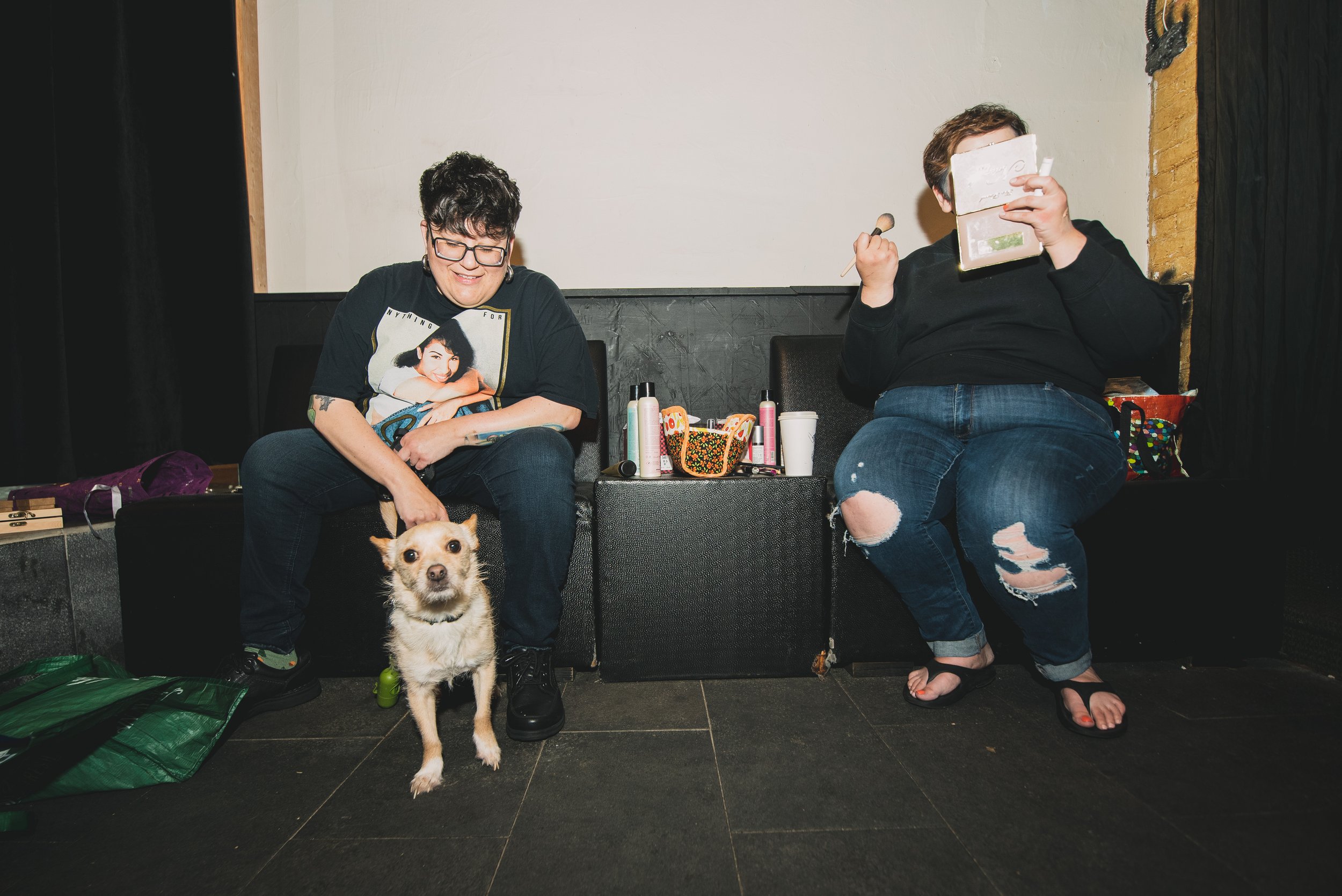
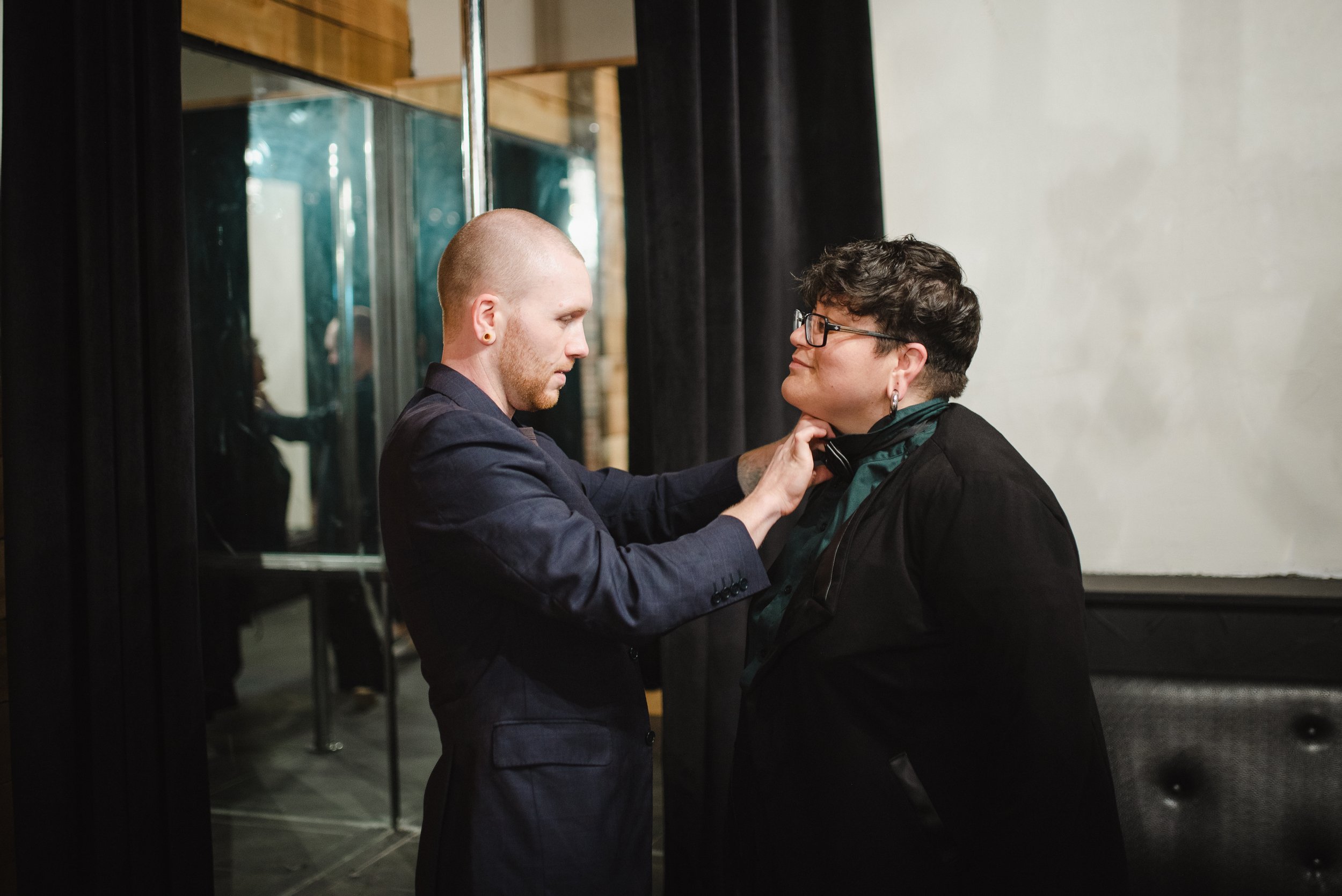
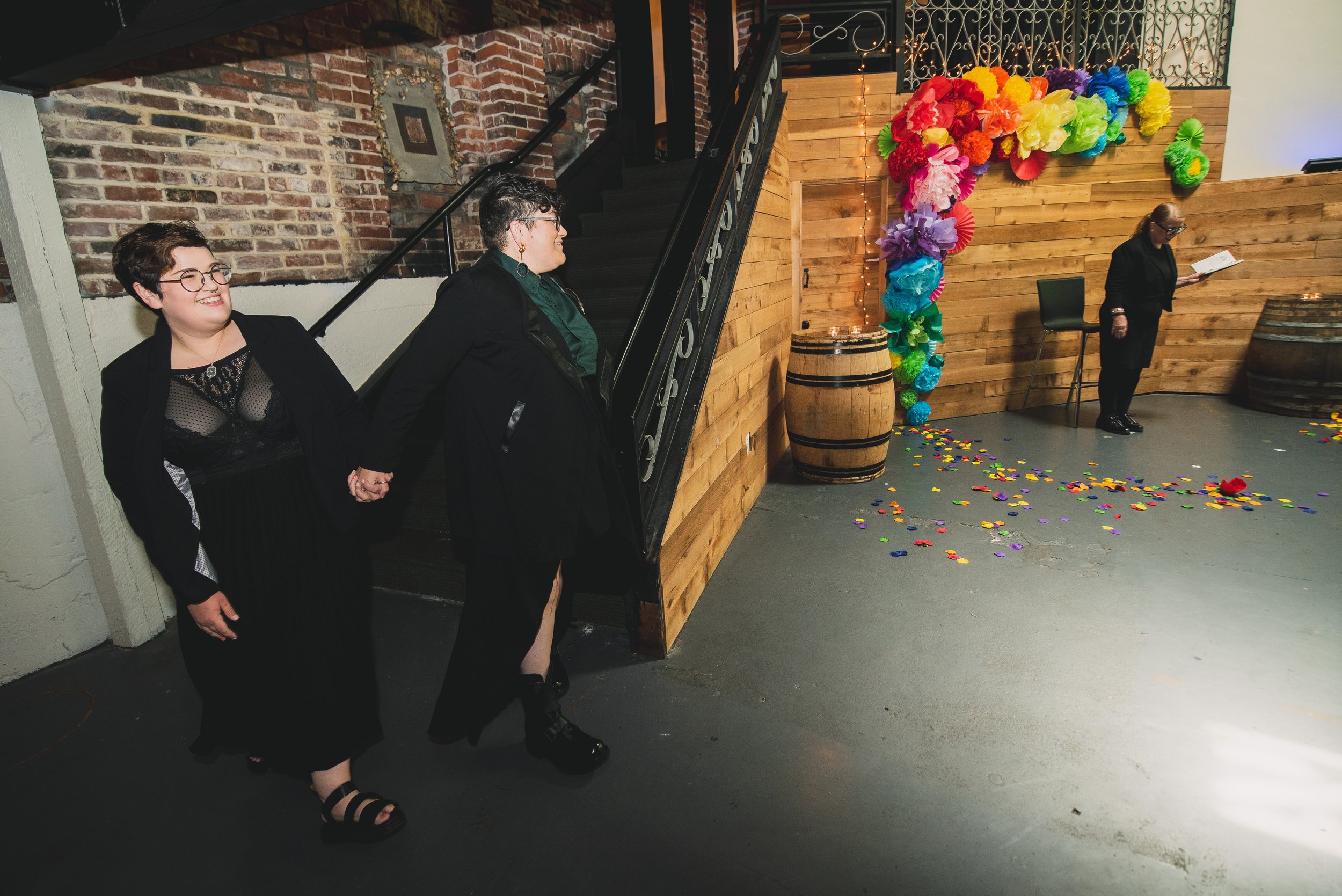
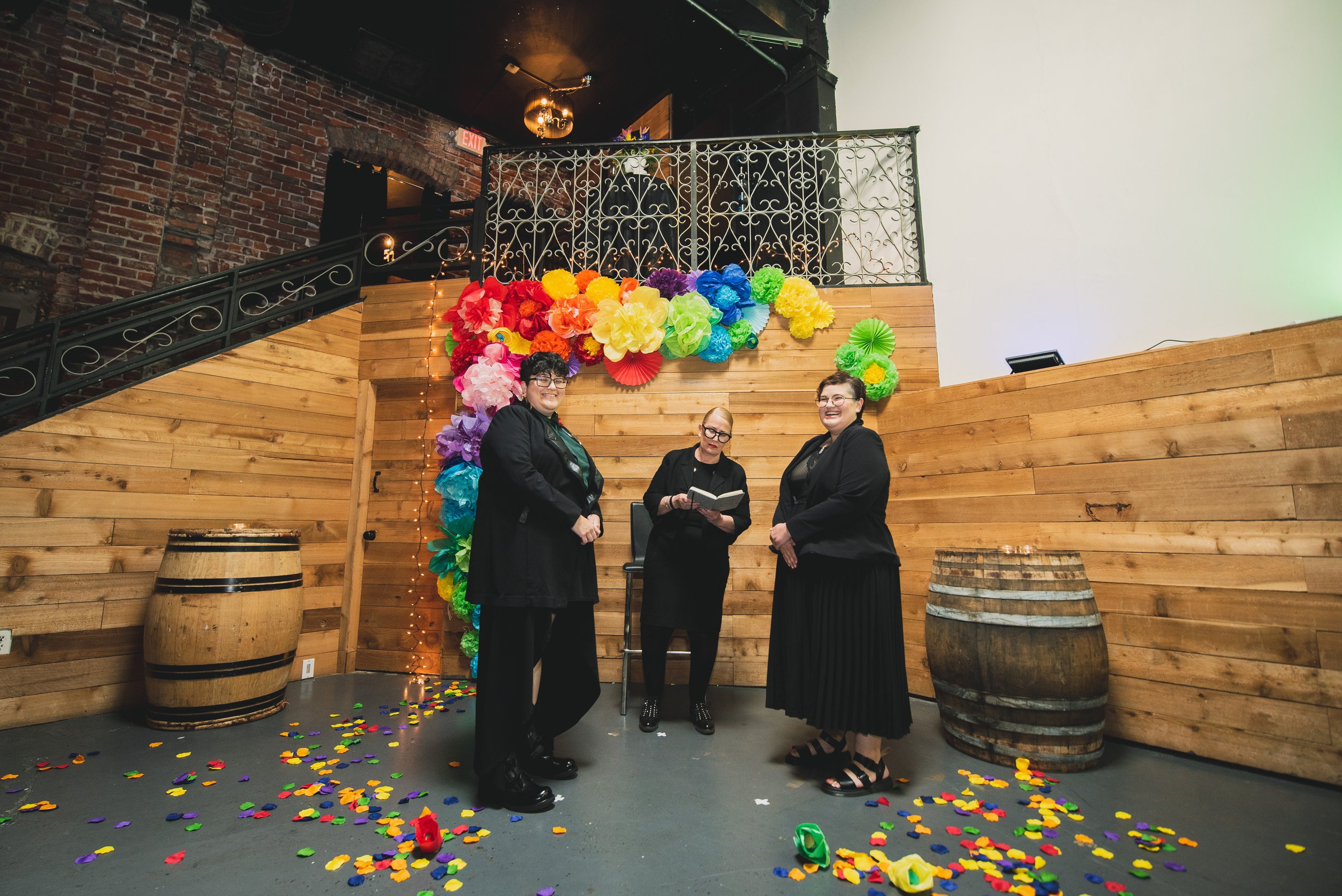
Corbin and Mariah preparing for and at the start of their ceremony
"Happy wedding day! This is a glorious day, obviously, the sun outside, I mean, nothing... nothing could go wrong… especially after getting all those flowers up last night"—she'd spent hours the previous night taping paper flowers onto a wall to form the arch behind Mariah and Corbin—"But anyway, thank you for attending, and I do have a question for all of you who are seated. I would like to know, as family and friends of the happy couple, will you support and love this couple on their journey into marriage? If you do, can I hear a resounding, we will?" A chorus replied, along with whoops and cheers and claps. "We will!"
Corbin and Mariah during their ceremony
"When I met Corbin and Mariah about creating the vows for the ceremony, I wanted to find out the history of their love. So we went out to dinner and I had a whole list of questions to ask. And I look at Corbin, and I said, so how did you two meet? And you said..." Corbin took her cue, and waived a finger in the air, adding a little pause between each word for emphasis. "I swiped right," she said with a look of satisfaction. Their guests laughed; Mary continued. "Corbin said that after looking at Mariah’s profile that she saw her charismatic energy, and it swept her off her feet. Mariah said about Corbin that she’s so easy to talk to and always makes her laugh. Corbin said of Mariah that she's funny, the binder of all things, and loves fully. Mariah said Corbin is funny as hell, kind to others, and is always up for an adventure. The best adventures they have are camping with Rocky Roy"—Mariah and Corbin's small and anxious cairn terrier and chihuahua mix who, during the ceremony, sat whimpering in a friend's arms waiting for them to pick him back up—"being tourists in their own city, and surviving COVID in 600 square feet."
Rocky Roy at the wedding ceremony
Mari asked Mariah and Corbin to join hands, and invited their friend Syndey to recite a poem, A Line-Storm Song by Robert Frost. The first stanza read:
The line-storm clouds fly tattered and swift.
The road is forlorn all day,
Where a myriad snowy quartz-stones lift,
And the hoofprints vanish away.
The roadside flowers, too wet for the bee,
Expend their bloom in vain.
Come over the hills and far with me,
And be my love in the rain.
Corbin and Mariah’s friend reciting a poem
Mariah and Corbin's vows came next. Mariah began with a smile and a casual voice. "I'm just keeping it short and sweet. I'm so thrilled that I get to marry you, and I can't wait to grow old and be crazy old ladies together, even though some people say we're already there. I love you so much."
Corbin and Mariah reciting their vows
Corbin followed. "I... when I aahewfksw..." Her mouth fell agape and, for a moment, she forgot how to speak. Their guests’ laughter lent encouragement. "When I met you, I found my home.” She let out a small giggle. “I love you… and I like you”—a reference to something the characters Ben and Leslie in Parks & Rec often say to each other—"I really like you, a lot. And I can't wait for our adventures. We've already had a great story, and I can't wait for the rest of it."
Corbin celebrating after the pronouncement of marriage
After their ceremony and some pictures with their friends and family, Mariah and Corbin invited everyone to dig into the wine, charcuterie board, and dessert (they’d bought donuts in lieu of a cake) before two of their friends started a game of Bingo. The prize, they announced, would be a delightful calendar made of pictures of them through their relationship, each sporting new looks in every photo; green, orange, white and black hair, with and without glasses, overlooking Seattle, in coffee-shops and on camping trips.
Mariah and Corbin’s guests playing bingo, and the calendar prize for the winner
Soon after, around 2pm, they said goodbye to their families, Mariah's driving home and Corbin's walking to their hotel, leaving Mariah and Corbin with their friends and a venue they still had access to for the rest of the night. Corbin shouted from a balcony. “Now that the adults are gone..."—her expression changed to that of nefarious coyness—"if anyone wants to smoke a little weed… come out to the patio.” Someone ordered a few pizzas, and for the next hours, the sun setting on downtown Seattle, Mariah, Corbin, and their friends danced, drank, smoked, and laughed together in the exact relaxed manner they’d hoped for.
Mariah and Corbin with their friends and siblings towards the end of their reception
Mariah and Corbin both think the Pacific Northwest will be their long-term home. "If we end up moving away, it'll be for a job opportunity, but probably only for a bit of time before we come back," Corbin said. "We've always really respected each others' career paths, and supported each other in whatever the other wanted to do." Mariah has established a firm footing in hair and beauty; she specializes in coloring and color correction, and before the pandemic was on a steady transition into education, teaching classes that filled the gap between beauty school and the reality of the work. She hopes to return to it and perhaps even travel for it more. (She offered a mini-lesson to me as she cut and re-dyed my hair a few days after the wedding, talking to me about the chemicals and how she balanced the reaction, and we bonded over the similar psychologies of our work; how photography and hair were so linked to people's perceptions of themselves, and how making someone else feel comfortable in the process formed our cores.)
Me and Mariah as she cut + colored my hair
Corbin currently works at the reception desk for a hotel just a few minutes away from her and Mariah's apartment, and she told me about how being in such a stable relationship with Mariah had allowed her to think of more long-term career plans. "I recently started working on getting some IT certificates, things like HTML, eventually full-stack programming and Python," Corbin said. She’d recently enrolled in a coding bootcamp, and planned to start applying for jobs in tech after she completed it in early 2022.
Both are fully happy to spend their lives together, alone. "We're never-say-never people, but we also never want kids," Mariah said with a chuckle. "I love that my friends have kids, but we're happy just being the cool aunts and taking care of other people's kids, not our own." They hope to travel a bit, and spend some time living in a camper van and visiting more parts of the United States. Beyond that, their dreams for the future are sure in only one thing: having each other. Corbin mused about how this was exactly the life she'd dreamed of having when she left California. "I'd moved to Seattle, and kind of just started to build a new foundation for myself in life," she began. "And then Mariah came around. And it took some time to realize, oh, I have a partner who's supportive and loving, and where I can refocus on the rest of my story and not be in survival mode all the time anymore. This stable, safe, healthy relationship really opened up that path.” Her new dreams fill with the same things we all hope for: seeing more of the world, finding happiness in hobbies and a career, growing old. All with someone she loves and who loves her.










